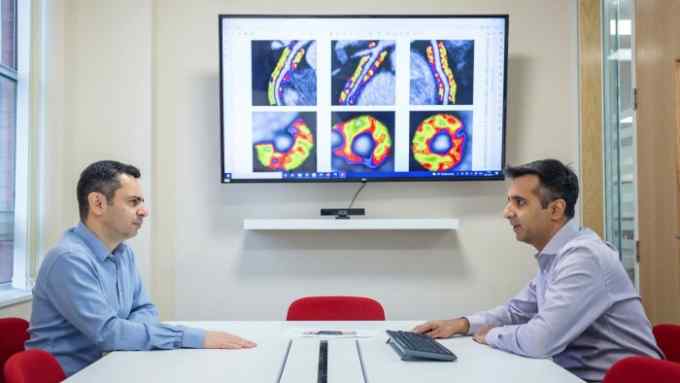Mexican platform advances digital diagnostics in Latin America

Roula Khalaf, Editor of the FT, selects her favourite stories in this weekly newsletter.
With various types of cancer running through three generations of his family, 22-year-old tech entrepreneur Julian Rios Cantu was not surprised when his own genome sequencing revealed a predisposition to the disease. Explaining how he came to found Eva, a Mexican health-tech start-up, he says: “Cancer has been a constant in my life. As someone who will eventually face it, my mission is very personal.”
Cantu was 16 when he and three friends devised a high-tech bra to help women self-diagnose breast cancer. The garment holds biosensors that map and monitor heat in the breast, indicating potentially malignant lumps.
Their business faced barriers to growth, such as the high cost of large-scale production of the bra. So they decided to apply the technology in a clinical setting. By 2020, Eva had built a network of 15 booths in Mexico to perform thermal-imaging tests that deliver results in 10 minutes.
But, as in-person medical appointments went online during the Covid-19 pandemic, Cantu and his partners closed the diagnostic booths and switched the start-up’s focus to the gap between supply and demand for image-based medical diagnostics. Since August 2021, Eva has set out to improve outcomes for patients and increase efficiency for clinics by digitising radiology processes.
“Running the clinics, we noticed a lack of radiologists: we only have about 7,500 of them [in Mexico] for a population of 120m, and this gets worse outside large cities,” Cantu says. He also says that much of the hardware and software clinics use for diagnostics is outdated and expensive.
More than 100 companies, mostly medium-sized clinics, now use Eva’s subscription-based picture-archiving and communication system (Pacs) to view, analyse, report and send results to patients and their doctors via email or WhatsApp. Images are captured by clinics’ own equipment, with Pacs sending them to the cloud, along with clinically relevant reports.
The platform enables physicians to reduce paperwork, as radiology reports can be accessed digitally. Images can be enlarged and rotated, allowing for better interpretation and analysis. By digitising the test process, Eva says its services are significantly cheaper than using physical imaging plates.
Radiologists can operate remotely through Eva as service providers, which also cuts turnround times for results. As part of its social impact initiatives, Eva also partners with non-profit organisations, to capture images of patients in remote communities and use the start-up’s system for processing and diagnostics. “We can deliver results within 48 hours — users in underserved areas usually have to wait a month or longer,” Cantu says.
Backed by investors including Silicon Valley-based accelerator Y Combinator and Latin America-focused venture capital group Kaszek Ventures, Eva has raised more than $12m in funding since its inception. Currently employing 25 staff, it is targeting expansion into Colombia and elsewhere in Latin America this year.
Despite developments in areas such as telecare and digital diagnostics, access to healthcare in Mexico remains challenging, says Sonia López Álvarez, a doctor and executive director of the Mexican Society for Public Health (SMSP). “We are very far from providing universal care,” she says.
López Álvarez highlights a disconnect between healthcare platforms that is hampering progress. “The public and private systems use several platforms that don’t talk to each other. That negatively impacts outcomes for patients, since their information is all over the place,” she says.
“There needs to be political will to address these issues, and a focus on training more medical practitioners in technologies to improve care. The public also needs to know what [health] tech is out there and how it can be used to help.”
Eva plans to harness automation to help radiologists save time, as well as management systems to address issues such as the lack of interoperability, Cantu says.
He says Eva takes data privacy seriously and the company adheres to US standards for sensitive information. “Latin America doesn’t require that level of data management sophistication — we do it because we think it’s right,” he says. “Well-capitalised companies like mine have a responsibility [to comply with] data protection.”
Mexico does not have a problem with data protection, Cantu says, but one with accessibility to health services. “People are dying in hospital corridors without proper care, or at home, due to lack of medication,” he says. “You cannot [focus on] data privacy when people are not getting dignified healthcare.”
For that reason, Cantu suggests that developing countries should be careful about “mimicking” data privacy frameworks in the US and Europe. “What we cannot end up with is regulation that shoots ourselves in the foot in terms of providing better healthcare for people.”

Comments